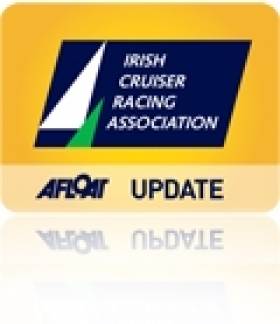Having tacked down the southern seaboard of Ireland after rounding Tuskar Rock, all boats in the Normandy Channel Race have now rounded the Fastnet and are heading east on the homeward leg. The Normandy Channel Race is one of many that visit Irish waters without stopping, with the Mini Fastnet and others dipping into our territory to find a high-profile rock before fleeing again.
The 8 competitors are making for the Scilly Isles, a string of rocks scattered about the South-West tip of England. To the great delight of these sailors, the fog, which has been tenaciously clinging onto them for the past three days, is gradually dissipating the further South the Class 40s sail. However, little else has changed and they’re still canted over against the wind as they make headway towards the English Channel and Normandy.
"Destination Dunkerque" skippered by Thomas Ruyant-Tanguy Leglatin is continuing what can only be described as a faultless race, admirably optimising their course. No pointless tacks for Tom and Tang then, who are just 300 miles from the finish this morning. Last night’s SE’ly breeze is likely to ease as day breaks and shift further round to the East. As such the ETAs don’t see the fleet crossing the line in Hermanville sur Mer before Sunday morning. In the wake of these solid leaders, the Dutch-Belgian duo Roelland Frannssens-Michel Kleinjans (Moonpalace) were still battling it out for second place with Halvard Mabire and Peter Harding yesterday. However, since then the two boats have split apart with a massive 20 mile lead going to “40 Degrees”. "Moonpalace” must now keep an eye on what’s going on around her and in particular the ‘miraculous’ performance by "Appart City" skippered by Yvon Noblet and David Taboré, which we can recall came close to dismasting two days ago and has since been sailing with a patched-up rig.
Night message from Halvard Mabire, co- skipper to Peter Harding in the Class 40 “40 Degrees”, currently second in the Normandy Channel Race:
"We can’t really say that we saw a lot of Ireland! The Fastnet? We barely saw the base of the rock when we went round it. We didn’t even see the base of the lighthouse. Nothing. You have to wonder a little about how, long ago, you could have managed to sail this course, almost constantly skimming past the rocks without ever seeing them. However the GPS doesn’t date back that long ago. It became fairly commonplace in the early nineties. In 91 we began to have them on the Figaro, which shook things up a bit. ‘Long ago’, which does seems a long time ago now (it has to be said that it was during the last century, in the period of black and white and silent films!), even before you knew where you were going, you already had to know where you were. Today we know perfectly well where we are, even if we can’t see a thing! When you think about it it’s funny to know exactly where you are on a map, or on a computer screen, whilst in fact you’re nowhere because you can’t see anything! Where does the reality end and the virtual begin? What’s staggering is the speed at which things become part of everyday life on a cultural level. Today nobody wonders about the very recent problems of positioning because we’re surrounded by GPS systems, which are constantly telling us not just where we are, but can also track anything or anyone. Anybody can position any object or any person on a map, without even knowing which way is North, or without having the slightest idea about basic orientation in relation to the sun. Once the great mystery of positioning is no longer there, it becomes more difficult to do something sensational. Everyone remembers Tabarly looming up out of the fog in Newport to take victory in the Transat in ‘76. Probably an element of the media success of this victory stemmed from the fact that it was unexpected and that it came out of the fog like a divine apparition.
Now you all know where we are and the ranking, which is constantly displayed, no longer allows you to fill pages with suppositions and forecasts. I’m under the impression that everyone wonders a bit about what they’re going to be able to talk about. That’s why they ask us if we have a ‘strategy’. At the risk of disappointing a lot of people, I can tell you that strategy, that’s to say deciding in advance what you’re going to do, is a load of hot air for boats like the Class40s. Solely the big multihulls vying for transoceanic records can really play with the weather, otherwise, as a general rule, it’s the weather that plays around with the boats. We find ourselves in a particular place at a particular time and there are not really any choices to be made. Or rather, if you can choose, it comes down to trying not to do something silly or avoiding doing something you mustn’t do on any account and that’s how you ‘give up’ up places to others. When you’re making virtually no headway at all, you can’t ‘traverse’ the race zone to hunt down a miracle. That’s why you notice that more and more the “fleet is right” (which is par for the course with the rising standards) and that ultimately the winner has rarely strayed far from the most direct course. The positioning of the race boats really comes down to a series of reactions in relation to an instantaneous situation, rather than a strategy decided in advance. All that to say, on 40 Degrees the strategy is not to have one and instead it’s all about adapting as best you can to the situations which present themselves."

























































